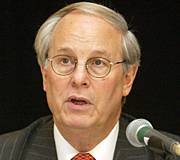Thursday, Jan. 31, 2008 | 2 a.m.

Frank Fahrenkopf, chief executive of the American Gaming Association
The explosion of gambling revenue in the Chinese enclave of Macau has other countries in Asia coveting similar riches — while avoiding the downsides that have tarnished Macau in years past.
The countries include South Korea, which offers limited gambling to foreigners, and Japan, where only small-stakes, pinball-like devices are legal.
These countries want the tourism boost and tax revenue that flow from big casino resorts without the widely reported incidents of loan sharking and skimming in the region’s VIP rooms — independently operated gambling rooms that attract high rollers and have eluded stringent regulatory controls.
The U.S. gaming industry is positioning itself to help shape the global expansion of gambling — and to get a piece of the business.
Enter Frank Fahrenkopf, chief executive of the American Gaming Association, who is visiting the new markets and explaining to officials there how to avoid the kind of corrupting influences that plagued Las Vegas’ formative years.
Normally, Fahrenkopf lobbies Congress on matters such as tip taxes and Internet gambling, and sometimes testifies before state legislatures considering the legalization of casino gambling.
His globe-trotting role may be more crucial for the long-term growth of his industry — that of gaming ambassador abroad.
In recent months, he has traveled to Singapore (where major casino resorts are expected to open in the next couple of years) and South Korea, and is anticipating a trip to Japan in the fall.
In the United States, Fahrenkopf’s job appears opposite to that of other special interest groups. Rather than pushing for special consideration in Congress, he aims for the gaming industry — a mostly state-regulated enterprise — to be ignored by the federal government.
Abroad, his message is even more unusual than those of most industries seeking expansion opportunities.
That’s because Fahrenkopf doesn’t pitch so much as lecture.
He gave one of his first and most critical lectures in Macau more than five years ago, before the Chinese government broke Stanley Ho’s decades-old monopoly and opened the region to foreign investors including Las Vegas Sands, Wynn Resorts and, now, MGM Mirage.
“I made a very tough speech about what they had to do to attract American companies,” Fahrenkopf said.
The message was simple: Confer with Nevada regulators and adopt Nevada-style regulations and then we’ll get back to you.
Macau regulators were soon making multiple trips to Nevada at the invitation of the state’s Gaming Control Board.
Fahrenkopf, a forceful personality in the gaming industry, deserves credit for paving the way for American companies abroad, said Fred Gushin, managing director of Spectrum Gaming Group, a consultant that has helped American companies break into foreign markets.
“He understands that tough regulations and successful casinos go hand in hand,” said Gushin, a former regulator with New Jersey’s Gaming Enforcement Division.
The entry of the Sands, Venetian and Wynn resorts in Macau has changed the market — by all accounts, for the better.
They are attracting well-heeled Asian tourists and helping to transform the once-seedy gambling den into a Las Vegas Strip vision of success. More important, these resorts are helping to legitimize Macau’s casino industry — attempting to accomplish in a few years what took Las Vegas decades.
The Macau cleanup effort, experts say, is going to take more than a few years. While credit granted to gamblers is enforceable in Nevada courts, there’s no such enforcement in China, which is why loan sharks in Macau, like the Las Vegas heavies of decades past, have a history of using shady characters to collect debts.
“It’s unreasonable to expect Macau to do in five years what took Las Vegas decades,” Gushin said. “Although successful from an operational perspective, from a regulatory perspective, there still needs to be some improvement.”
Last month, the South China Morning Post reported that five casino executives polled in Macau acknowledged that junket agents — people who aren’t employed by the casinos but who bring in high rollers for a cut of the profit — are involved in major skimming operations that might have cost casinos $13 billion over the past five years.
Fahrenkopf says he gives foreign governments the straight talk.
“We’re an interesting industry because we want tough regulations,” he said.
By law, Nevada casino operators can lose their licenses for misdeeds they commit in other countries, including happenings under executives’ radar.
With the spectacular profits generated by Macau casinos in recent years, other governments want similar destination-type resorts where shopping, conventions and entertainment are more the focus than gambling, Fahrenkopf said.
Besides meeting with Nevada regulators, where do foreigners new to gaming learn to regulate?
Some go to conferences such as those of the International Association of Gaming Regulators’. The educational group started with some Nevada attorneys, including Fahrenkopf.
Some go to UNLV’s International Gaming Institute, which holds generic as well as custom, by-appointment-only training courses for regulators around the globe.
The institute has been expanding its training sessions to accommodate more interest from regulators, said Patty Becker, executive director of the institute and a former member of the Nevada Gaming Control Board.
Next week Fahrenkopf will be on a plane to London for the International Casino Exhibition, the largest industry show outside of Las Vegas.
Macau is triggering gaming legalization across Asia, while countries in the European Union already have casinos and government-run lotteries but are struggling to standardize a patchwork quilt of laws and regulations.
Standardization would make gaming expansion easier, but some countries are reluctant to allow competition, especially from Internet gambling operators, Fahrenkopf said.
He said he will advise European operators on creating their own gaming association.

Join the Discussion:
Check this out for a full explanation of our conversion to the LiveFyre commenting system and instructions on how to sign up for an account.
Full comments policy